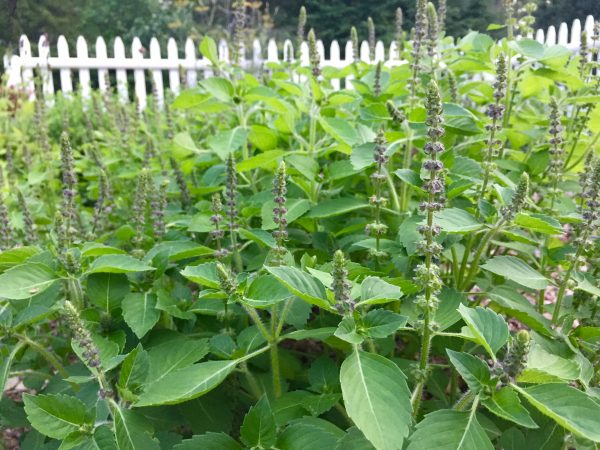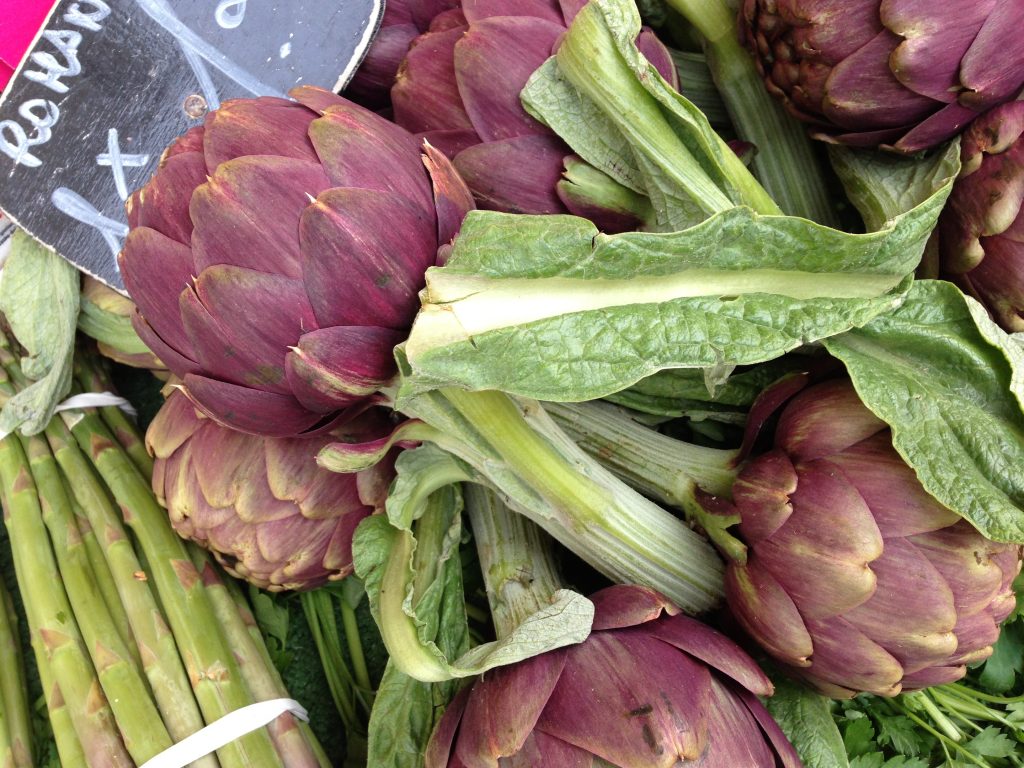I suspect that many of you can relate, and fortunately there IS a way to work with herbs and lifestyle to make the holiday food festivities less… impactful. Let me start by saying that no herb is a weight loss miracle. Sad to say, but you’re not going to pop a pill and shed pounds (without any long-term safety issues). But, the following remedies and tricks will help curb overeating, limit stress (and thus, stress eating), regulate hunger/satiety hormones, modulate blood sugar to limit those “give me more cookies!” crashes, and make you crave healthier food over sweets and junk. Sound like a plan!
6 Herbs & Tricks to Prevent (or Limit) Holiday Overeating
1. Bitters
Taking something bitter-tasting before you eat can help reduce the amount of calories you consume by about 20% — that’s not too shabby. Herbal “bitters” include artichoke leaf (personal fave, pictured above) as well as dandelion root (mild) and (the ever-popular but less sustainably harvested) gentian root. These are often formulated with some warming spices and a hint of sweetness in an alcohol base that you can spritz in your mouth or add a splash to seltzer. Cocktail bitters come from this lineage but opt for those that are free from artificial colors and flavorings, such as the ones by Urban Moonshine. Roasted dandelion root tea by Traditional Medicinals works well, too (including for the aftermath of “oh, yah, I really should not have had that cupcake…). Food bitters include black coffee, bitter greens (radicchio, endive, dandelion, bitter lettuce, arugula, artichokes), tamarind, grapefruit, and citrus peel.
How to bitters work? They appear to have various actions: reduce the glycemic impact of the food you eat; improve digestion (reducing indigestion and bloat); regulate hunger and satiety hormones; decrease sugar cravings; and improve the desire for healthy foods. The effects may be noticeable right away but get better with regular use. They also work better if you taste them (so, no pills). Learn more about bitters in Guido Mase’s article here and this video/podcast.
2. Vinegar (and Sours)
Much like bitters, “sours” also appear to regular blood sugar and appetite. Studies support vinegar’s ability to improve weight loss and regulate blood sugar. Researchers report that ingesting vinegar (or peanuts… which aren’t sour but have appetite-regulating protein) resulted in people eating 200 to 275 calories throughout the day… that alone could equate to 1/2 pound lost per week without even trying. In another study, combining vinegar or pickled foods (such as vegetables) alongside rice reduced the glycemic effect by 20 to 35 percent — same portion of rice eaten, but it didn’t cause the blood sugar spike and crash that it normally would. Herbalists particularly like using raw, unpasteurized apple cider vinegar (made by Bragg or a small-scale local producer) for health benefits, though other quality vinegars likely offer similar support. You can add it to a little water to swig before a meal. In another study, adding vinegar (or a grapefruit, which is both bitter and sour) to the daily diet resulted in a few pounds lost over one to three months with no efforts made by participants to diet.

3. Sleep
Now that I have your attention, I have to mention that sleep duration or quality can make a bigger impact on your waistline than almost anything else! So many studies have explored and confirmed this link. Here are some highlights:
- One night of sleep deprivation led healthy adults to eat 500 or more extra calories the next day. This can equate to 1 pound per week gained.
- One night of sleep deprivation caused the brain’s ability to make decisions plummet, while the part of the brain that responds to rewards like sugar and salt skyrocketed. It can also alter your balance of satiety and hunger hormones.
- People who slept just five hours per night (as opposed to seven to nine hours) a more calories, chose junkier options, binged more at night, and gained two pounds in just five days!
- Sleeping less than 7.7 hours per night is associated with a higher BMI in all age groups.
- Every 30 minutes of sleep lost on average per night equates to a 41 percent increase in insulin resistance in the coming year. (Insulin resistance, sometimes called pre-diabetes, makes you more apt to gain weight, particularly around the abdomen, and increases inflammation.)
Prioritizing sleep is soooo important! If sleeping is a challenge for you, consider wearing and eye mask, reducing the bedroom temperature, unplugging from all electronics/screens at least an hour or two before bedtime, and avoiding big meals, snacks, and alcohol at night (just 2 drinks can really mess up sleep, especially in women). Herbally, I love magnolia bark (pictured above), passionflower, and/or skullcap. Some nice commercial formulas include locally made Herbal Energetics Peaceful Nights and Gaia Herbs SleepThru or Calm ASAP.

4. Ashwagandha
This Ayurvedic herb (Withania somnifera) is revered in India for its ability to improve strength, energy, and vitality while also promoting calm, good mood, quality sleep, reduced stress response, and decreased inflammation. It also mildly boosts thyroid function, which makes it potentially beneficial for the many women with mild hypothyroid or Hashimoto’s disease that can also lead ot weight gain. (Be careful using it alongside thyroid meds or in hyperthyroid disease, though — consult a professional herbalist or naturopathic doctor for guidance.) Ashwagandha works best when taken long-term and can be taken infused in hot milk, as tea, tincture, or capsule. One study explored its benefits for weight loss in women who were stressed out. The women took 300 mg of a standardized extract in pill form daily for eight weeks. It reduced food cravings, improved eating behavior, planning, reduced stress and the stress hormone cortisol, etc. Compared to placebo, the ashwagandha women had double the reduction in weight (3% vs 1.5%) and BMI (3% vs 1.4%) versus the placebo group. Most of us could use a little extra stress support around the holidays anyway!

5. Holy Basil (a.k.a. Tulsi)
Here’s another Ayurvedic herb (Ocimum sanctum, also called O. tenuiflorum) that also reduces stress and promotes calm energy with potential benefits for appetite regulation and weight. Holy basil tends to be particularly useful in regulating blood sugar, stress food cravings, and the stress/blood sugar hormone cortisol. I love combining it with green tea (more below) alongside a good breakfast (plenty of protein, some veggies, not too many carbs — beans or eggs at breakfast can be particularly beneficial for weight and blood sugar management). You’ll likely find that you’re less stressed, more satisfied by your breakfast, and that it’s easier to make healthy food choices throughout the day. Steep about 1 teaspoon of each for 5 minutes in a 16-ounce mug of near-boiling water. You can also take it in capsule or tincture, but the tea is nice. I prefer from-the-farm (or my garden) dried holy basil for the best quality. A lot of what’s on the market is pretty “meh.” Local growers that sell spectacular dried holy basil/tulsi online/via mail include Oshala Farm, Foster Farm Botanicals, Terra Basics,, and Zack Woods Farm. I generally prefer the kapoor/temperate variety, but they’re all good. If you prefer the convenience of a teabag, Organic India Tulsi Tea is available in many grocery and natural food stores, offering a variety of tea blends featuring holy basil.
6. Green Tea
Last but not least, we come to one of the most effective (while still being very safe) “weight loss herbs.” Even with that claim, green tea’s effects are somewhat subtle. The study results are a bit mixed, but in one of the more enthusiastic studies, taking green tea while dieting for 12 weeks resulted in three times more weight loss for the green tea versus the placebo group (15 versus 5 pounds lost). Although most of the studies use green tea extract supplements, various studies and case reports link green tea extract to liver toxicity. Therefore, I’d recommend sticking with the tried-and-true safety profile of green tea as a beverage. Quality matters. I particularly enjoy the organic, fair-trade jasmine green tea (loose or the exquisite pearls) from Mountain Rose Herbs or the fantastic Numi Tea Jasmine Green (loose, pearls, or bagged). White tea should offer at least as many benefits with slightly less caffeine, though it’s more expensive. Decaf offers some benefit as well. Aim for two to six cups daily (as long as you tolerate it), or 16 to 36 ounces of brewed tea.
So, there you have it. Definitely not miracle pills for weight loss but nonetheless definitely helpful, especially in helping us make wiser food choices and avoid overeating (while also balancing blood sugar and stress levels) during the holiday food fest. Buon appetito!
Clinical herbalist Maria Noël Groves sees clients and teaches classes at Wintergreen Botanicals Herbal Clinic & Education Center in Allenstown, New Hampshire.
The statements made on this blog have not been evaluated by the FDA and are not intended to diagnose, prescribe, recommend, or offer medical advice. Please see your health care practitioner for help regarding choices and to avoid herb-drug interactions.
Originally written in 2018. Updates made November 2024 to broken links and brand availability updates. These are simply products I like. I have no financial ties, no affiliate links.









